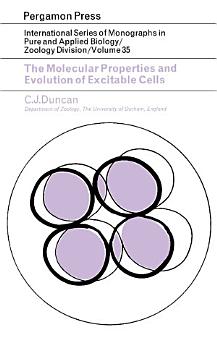The Molecular Properties and Evolution of Excitable Cells: International Series of Monographs in Pure and Applied Biology
C. J. Duncan
Oct 2013 · International series of monographs on pure and applied biology: Division, Zoology Book 35 · Elsevier
Ebook
268
Pages
family_home
Eligible
info
reportRatings and reviews aren’t verified Learn More
About this ebook
The Molecular Properties and Evolution of Excitable Cells describes the theoretical aspects in which excitable cells, such as nerves, muscles, and sense organs, operate. This book develops a hypothesis regarding the evolution and characteristics of excitable cells. This monograph focuses on the properties of the bounding membrane and its complex permeability system, which starts the excitation state. Sense organs, as the input component in both vertebrates and invertebrates, are then discussed. The text then briefly describes the ways that the ionic permeability of the excitable membrane can both be modified and controlled. The book points out that since ions pass through standard sizes of the pores in an excitable membrane, their passage is determined by the dimensions of the pore and by the existing charge found on its walls. The book then explains the application of a mechanical stimulus to a mechanoreceptor that will cause deformations in the membrane. This deformation leads to enzyme activity and produces alteration in the rate at which ATP is supplied to the lateral borders of the cell. The text discusses a hypothesis that invokes enzyme activity by propagating action potential along the axon, and other input systems, such as adrenaline, amino acids, and y-amino-butyric acid (GABA). The book also explains the hypothesis that living organisms are composed of an ordered system of protein-enzymes forming on phospholipid-protein membranes. This monograph will benefit microbiologists, biotechnologists, and academicians connected with the biological sciences.
Rate this ebook
Tell us what you think.
Reading information
Smartphones and tablets
Install the Google Play Books app for Android and iPad/iPhone. It syncs automatically with your account and allows you to read online or offline wherever you are.
Laptops and computers
You can listen to audiobooks purchased on Google Play using your computer's web browser.
eReaders and other devices
To read on e-ink devices like Kobo eReaders, you'll need to download a file and transfer it to your device. Follow the detailed Help Center instructions to transfer the files to supported eReaders.







